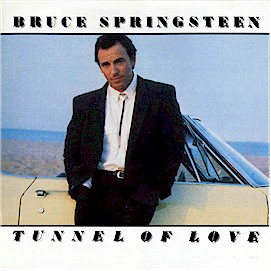 I was 17 the year Tunnel of Love was released; Bruce Springsteen was 38 and intent on ruminating, on taking stock, on running down a list of decisions and regrets, looking backward and around himself, because he was unable to see the way forward. I missed that then. To me, the album was just good; I simply didn’t know enough to recognize the pain and confusion that was quite real, quite apparent, had I known what to look for. Everything, it seems, was fair game, fodder for the music—his marriage, his sense of self-worth, his confidence in his ability to get even one thing right. What comes off the groove is not quite an emotional breakdown, but the tears are not far from the edge of his eyelids as he unloads some of the most trenchant, inward-looking lyrics he’d ever write, in a voice that is by turns soft/yearning and brash/cocky, set to music made almost entirely on his own. Tunnel of Love is an album-length meditation on the possibilities of love, as well as its limitations.
I was 17 the year Tunnel of Love was released; Bruce Springsteen was 38 and intent on ruminating, on taking stock, on running down a list of decisions and regrets, looking backward and around himself, because he was unable to see the way forward. I missed that then. To me, the album was just good; I simply didn’t know enough to recognize the pain and confusion that was quite real, quite apparent, had I known what to look for. Everything, it seems, was fair game, fodder for the music—his marriage, his sense of self-worth, his confidence in his ability to get even one thing right. What comes off the groove is not quite an emotional breakdown, but the tears are not far from the edge of his eyelids as he unloads some of the most trenchant, inward-looking lyrics he’d ever write, in a voice that is by turns soft/yearning and brash/cocky, set to music made almost entirely on his own. Tunnel of Love is an album-length meditation on the possibilities of love, as well as its limitations.
The sequencing of the songs on the record is masterful. Aside from the album-opener, “Ain’t Got You”—a goof, a jape; the juke to the left that enables the crossover dribble and move to the right for the easy score—the songs follow the progress of a relationship, from introductions, excitement, and uncertainty, through the blossoming of love and commitment, to the full fruition of that commitment, through the failures and fears and regrets that follow, ending with the hope that one’s decisions can serve one in good stead over the long haul.
Tunnel truly kicks off with “Tougher than the Rest” and “All that Heaven Will Allow,” two songs that explore the initial moments of giving into love, in spite of previous pain. “Tougher” is an echo-laden, arena-ready anthem in which Springsteen pulls off the feat of singing about vulnerability in the most heroic voice imaginable. He sees the object of his affection from across the room, and the attraction, by God, appears to be mutual. He knows, as he suspects she knows, that they could be heading for a world of hurt, but he is, at least tentatively, up for the challenge. “Somebody ran out,” he sings, “left somebody’s heart in a mess,” and it’s clear he’s talking about both of them. He’s not sure he can be the one for her—he’s neither handsome nor particularly sweet-talkin’—but if she’s “rough enough for love” and is willing to take the same shot he is, he’s willing to put himself out there one more time.
For all the big-room reverb in the song, the music is spare, and it segues nicely into “All that Heaven Will Allow”—the first date, if you will, when fear has melted into possibilities. The ideal is within reach, and the protagonist’s goals are simple—he wants everything. “Rain and storm and dark skies / Well now they don’t mean a thing,” Springsteen sings, “If you got a girl that loves you / And who wants to wear your ring.” That ring is the be-all and end-all—it represents the hypothetical forever, that point at which he and she can be together until there is no endpoint, ’til death they do part, without the faintest understanding of how long that truly is. It’s a plainly naÁ¯ve sentiment, but one that may well be universal—if you’ve been there, you recognize it here. Feel free to smile and/or cringe.
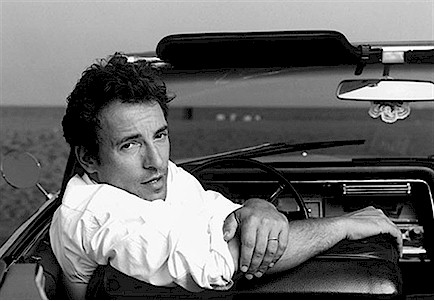 The fear and caution inherent in “Tougher than the Rest” come roaring back in the next pair of songs, “Spare Parts” and “Cautious Man,” both story songs that reveal deep personal truths, even fears, about their teller. “Spare Parts” is an unsparing look at a relationship born of lust and unintended circumstances (“Bobby said he’d pull out, Bobby stayed in / Janey had a baby; it wasn’t any sin”). The woman in the union is front and center, as she weighs the life of her son against her desire to be untethered, to explore “the party lights” again, to escape the wages of her fateful decisions. The underlying tug and pull of the song rests in Bobby, who abandons his lover and child, swearing “he wasn’t ever going back.” His fear and reticence to step up to his responsibilities is given voice by the harrowing, dissonant music Springsteen layers under his howling vocal—the squeaking, overdriven guitar; the amplified harmonica; the swells and ebbs of screaming and shouting background vocals.
The fear and caution inherent in “Tougher than the Rest” come roaring back in the next pair of songs, “Spare Parts” and “Cautious Man,” both story songs that reveal deep personal truths, even fears, about their teller. “Spare Parts” is an unsparing look at a relationship born of lust and unintended circumstances (“Bobby said he’d pull out, Bobby stayed in / Janey had a baby; it wasn’t any sin”). The woman in the union is front and center, as she weighs the life of her son against her desire to be untethered, to explore “the party lights” again, to escape the wages of her fateful decisions. The underlying tug and pull of the song rests in Bobby, who abandons his lover and child, swearing “he wasn’t ever going back.” His fear and reticence to step up to his responsibilities is given voice by the harrowing, dissonant music Springsteen layers under his howling vocal—the squeaking, overdriven guitar; the amplified harmonica; the swells and ebbs of screaming and shouting background vocals.
The music quiets as the intensity increases in “Cautious Man.” Springsteen tells the story of Bill Horton, a “cautious man of the road,” whose prudence extends to nearly every aspect of his life. Springsteen accents his creation, tellingly, with bits of Robert Mitchum’s preacher/murderer character from The Night of the Hunter—”On his right hand Billy tattooed the word love and on his left hand was the word fear / And in which hand he held his fate was never clear.” Horton marries a young woman, builds them a house, and immediately questions his decisions, praying for steadiness that eludes him, “for he knew in a restless heart the seed of betrayal lay.” Ultimately, he recognizes in himself a distance from his wife, a coldness he cannot name, but knows he will always have. The song ends ominously; he gazes on her face as she sleeps, the “beauty of God’s fallen light” all around them, but that icy feeling in him remains. Springsteen leaves us hanging here—will Billy give into his cautiousness, and match his emotional distance by putting a physical distance between him and his wife?
He delves deeper into the meaning of commitment in “Walk Like a Man.” The singer is committed, but recognizes the price such dedication can exact. It’s his wedding day; his father—perhaps his hero, in spite of their differences—offers his best wishes in a handshake, then cries on his son’s shoulder. “So much has happened to me that I don’t understand,” the singer muses, and the story lifts into memory—first a beach vacation, then of weddings at a local church that his mother would drag him to watch. “Would they ever look so happy again?” he asks, and it’s unclear whether he’s asking the question then, as a child, or now, as a groom at the altar.
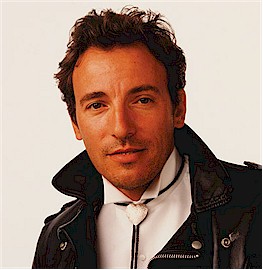 The devastating lines of “Walk” come in the final verse:
The devastating lines of “Walk” come in the final verse:
Well now the years have gone and I’ve grown
From that seed you’ve sown
But I didn’t think there’d be so many steps
I’d have to learn on my own
Well I was young and I didn’t know what to do
When I saw your best steps stolen away from you
Now I’ll do what I can
I’ll walk like a man
And I’ll keep on walkin’
The weight of the verse is palpable. Time is both boon and bane in the life of a relationship. A son can move away from his father for any number of contentious reasons (Bruce and Douglas Springsteen’s relationship was famously so), which brings freedom, certainly, but also costs that must be borne. Time can heal wounds, but it can also expand emotional gaps. When that time runs out, it’s gone for good, and that ending can be heartbreaking and empowering all at once. Once you know you’re on your own to figure this stuff out, you either fold or double down. Springsteen’s protagonist takes the latter tack, and in the song’s final image, the toll of the decision is telling. “And I’ll keep on walkin’,” he sings, recognizing that, even as he and his betrothed vow to walk together, a large part of who he is, has been, and always will be, will make the journey alone.
Side Two explores what happens after the wedding, when the real work begins. The title track’s central metaphor of love as a scary thrill ride starts the side with one of Springsteen’s richest musical moments. It’s Asbury Park writ large and spooky—boardwalk noises give way to keyboards and guitar and Max Weinberg’s mighty kick drum. The scene starts promisingly—the singer and his lady enter and the ticket-taker ogles the young lady as they get on the ride and commence to cuddlin’, the singer’s fingers finding their place on her blouse and unnamed “soft thrills” likewise commencing. All this gives way to greater, less pleasurable thrills—the fears a couple encounters once they’ve given themselves to their coupledom. It sits between them like a third body—”you, me, and all that stuff we’re so scared of”—and they briefly lose one another in the enveloping darkness.
Nils Lofgren’s slashing, harmonic-laden solo gives a voice to that fear, slicing through the shadows, leading the singer to a realization that is, in large part, a resignation. Sure, “it ought to be easy, ought to be simple enough” for two people to get and stay together. To get together, as he said in “Tougher than the Rest,” “all you gotta do is say yes”—get past your past and all the accumulated bullshit and take to the dance floor for a slow one. It’s the staying together that’s harder, perhaps the hardest of all. “You’ve got to learn to live with what you can’t rise above,” Springsteen almost sighs into the music, which builds to yet another crescendo. What do you do when the ride is no longer fun?
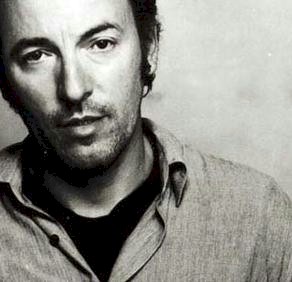 You turn on yourself, he seems to say. If “Walk Like a Man” and “Tunnel of Love” are his OhmygodwhatamIdoing songs, “Two Faces” and “Brilliant Disguise” are his OhmygodwhathaveIdone songs. In the former, he recognizes in himself the ability—if not the damnable willingness—to betray his beloved, and he is close to hurting her. While one side of his personality takes pleasure in making her happy, the other side “does things I don’t understand,” giving into darker urges and the willingness to push her away, to believe their life together is “just a lie.” It’s an extraordinary admission, to recognize in oneselve the destructive elements of one’s personality, to feel “like half a man,” unable to place any kind of control over them, and to do this while maintaining the sunny disposition, the brilliant disguise, that reveals none of this to the woman.
You turn on yourself, he seems to say. If “Walk Like a Man” and “Tunnel of Love” are his OhmygodwhatamIdoing songs, “Two Faces” and “Brilliant Disguise” are his OhmygodwhathaveIdone songs. In the former, he recognizes in himself the ability—if not the damnable willingness—to betray his beloved, and he is close to hurting her. While one side of his personality takes pleasure in making her happy, the other side “does things I don’t understand,” giving into darker urges and the willingness to push her away, to believe their life together is “just a lie.” It’s an extraordinary admission, to recognize in oneselve the destructive elements of one’s personality, to feel “like half a man,” unable to place any kind of control over them, and to do this while maintaining the sunny disposition, the brilliant disguise, that reveals none of this to the woman.
Springsteen picks up the thread in “Brilliant Disguise” and the ensuing paranoia caused by his dishonesty finally causes him to snap in some deeply emotional fashion. He hears her whisper something to him and turn away, hears someone call to her from beneath a willow tree, sees her shamefully tuck something under her pillow (her wedding band? A tear-stained memento?). He weighs his own reticence with what he perceives is her own, working through his secrets by obsessing on what she, in turn, might be keeping from him. “I want to know if it’s you I don’t trust,” Springsteen sings, “’cause I damn sure don’t trust myself.” Nothing is working. They play roles (loving woman, faithful man) with a superficial trust that they never question, never even discuss, but which is cracking apart right under them. The tension builds until he has a late-night epiphany that shatters any pretense of trust, that enables him to give into his deepest fears of what they’ve done and what they might yet do:
Tonight our bed is cold
I’m lost in the darkness of our love
God have mercy on the man
Who doubts what he’s sure of
What crumbles here is not a marriage, but the idea of destiny, that two people are meant to spend their lives together, forsaking all others, forsaking their basic nature as humans—as mammals, fer Chrissakes; how many other species mate for life?—tying their lives and expectations to someone else and expecting their attraction to last the whole of their lives remaining. The most cynical among us might laugh at the import placed upon societal norms regarding marriage, or on the weakness of certain people when it comes to living alone, or the independence some are willing to trade for some semblance of emotional security. God have mercy on the man who has bought into this, they’d say, only to realize he had a choice all along, and the one he made must either serve him in good stead, or stand as the subject of regret, the cause of pain, the betrayal of trust and/or one’s nature.
The final three songs on Tunnel of Love explore the aftermath of this epiphany, and taken together, they form a picture of a man slowly moving away from his promises, only to circle around again. “One Step Up” paints a portrait of marital discord, as the narrator moves from his home to a motel to a bar, considering the depth of his unhappiness, seeing and hearing proof of it everywhere he goes. “We’ve given each other some hard lessons lately, but we ain’t learning,” he thinks, pitifully. “We’re the same sad story, that’s a fact.” As a repeating figure plays on an acoustic guitar, he ambles through time (a day? A week? There’s no indication) with the arguments haunting him, the slamming doors giving way to songless birds that cross his path. “When I look at myself, I don’t see the man I wanted to be,” Springsteen sings, regretting the point in his life at which he “stepped off track,” without being able to pinpoint when exactly that happened. He makes eye contact with a woman across the bar—”she ain’t lookin’ too married / Me, honey, I’m pretendin'”—but all that arises in him is a dream of his wife. Whether he brings himself to give into temptation is unclear, but the dour tone leads one to believe he’d likely not enjoy such an encounter in his current state.
“There’s things that’ll knock you down you don’t even see comin’,” Springsteen sings in “When You’re Alone,” and one of those things is finding out your spouse has had it, and wants out. It’s the woman leaving the guy this time, but it’s not difficult to imagine Springsteen projecting the issues assumed by the narrators throughout Tunnel of Love, onto the protagonist’s lady. The repetitive chorus kinda grates after a couple turns, but it drives its point home effectively—when you’re alone, there’s nothing but that alone-ness to accompany you. You take your shot, you make your decision, you give into those expectations and pair up—supposedly for life—and it doesn’t work out. “It’s just nobody knows where love goes,” he sings, “but when it goes, it’s gone, gone.” You wind up back at square one, on a Saturday night, watching someone across the room, hoping she’s watching you back.
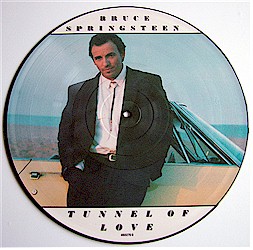 Alternatively, you work it out. You put it all back together, bring it back home, stick it out. You recognize you’re human, a creature not necessarily built to join with another for life, but you make the decision to do it anyway. There is love, after all. But there’s also a nagging in the back of your mind, and always will be. It sends you out to the highway, to drive into the night, to clear your head, give yourself the chance to think, give yourself at lease the appearance of the chance to drive away, to keep going until you find what you think you need.
Alternatively, you work it out. You put it all back together, bring it back home, stick it out. You recognize you’re human, a creature not necessarily built to join with another for life, but you make the decision to do it anyway. There is love, after all. But there’s also a nagging in the back of your mind, and always will be. It sends you out to the highway, to drive into the night, to clear your head, give yourself the chance to think, give yourself at lease the appearance of the chance to drive away, to keep going until you find what you think you need.
What you need, though, is miles behind you, sitting in that home you’ve built for yourselves. She’s safe, but you’re not. You turn it around and put the pedal to the floor, praying you haven’t driven too far.
Such is the state of the man in “Valentine’s Day,” the last song on Tunnel of Love. With a bed of music that harkens back to Dylan’s Blood on the Tracks, Springsteen gives voice to a man who drives with one hand “steady on the wheel” and the other “tremblin’ over my heart.” His wanderlust has turned to fear—fear of losing his wife to something, anything, the finger of mortality or the hardness of his heart, both equally cold. A switch has flipped within him, though—perhaps it’s the news of a friend becoming a father; perhaps it’s the epiphany from “Brilliant Disguise,” only in reverse. God have mercy on the man who is so certain of his doubts that he throws away a woman who truly loves him, who he truly loves. “He travels fastest who travels alone,” he muses, but the pull of that love is greater than any pull to leave or run.
Of course, in the years to follow, Springsteen would run. He’d leave his wife and marry his backup singer; they’d leave Jersey for LA; he’d break up his band and make lackluster records with session musicians. He’d have something of a midlife crisis right there in public, a crisis that would call into question his ongoing viability as an artist. He would run, but like the protagonist in “Valentine’s Day,” he’d come back, at least to the band, and to his muse. It just took a while to unfold.
In 1987, though, nothing seemed quite so clear. In 1987, Springsteen was just feeling his way through the argument his heart and head were having. The work that emerged was arguably his last great statement as a songwriter for a good 15 years, one that revealed some very personal truths in some very stark terms. Tunnel of Love takes little time or effort to enjoy—it’s a well-crafted record, one that spawned several hits—but in order to truly appreciate it, it helps to have found love and experienced pain, the pain of being hurt by the one you love, or the pain of recognizing the hurt you have caused someone else. It helps to have run the gamut of giddy excitement, serious commitment, terrifying uncertainty, and warm relief.
In 1987, I loved the album. Now, however, I get it.





Comments